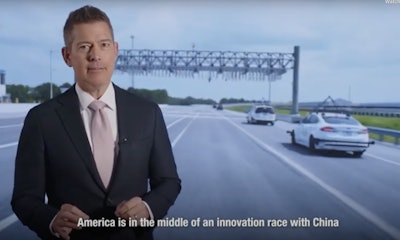
Department of Transportation Secretary Sean Duffy on Thursday released a video announcing a new federal framework for autonomous vehicles as part of what he called the department's "Innovation Agenda."
Much of DOT's top brass has ties to autonomous trucking companies, and Duffy promised this type of innovation was "one of my top priorities" in the video announcement.
“America is in the middle of an innovation race with China and the stakes couldn’t be higher," said Duffy. "That’s why we’re unveiling a new automated vehicle framework as part of our DOT’s Innovation Agenda.”
As part of that agenda, the National Highway Traffic Safety Administration created a new Automated Vehicle (AV) Framework which includes an amendment to the agency’s standing general order for reporting on crashes with AVs, and domestic exemptions for NHTSA’s automated vehicle exemption program.
"When it comes to safety, we’ve heard from industry partners that crash reporting requirements for AVs are way too expensive," said Duffy. Now, he intends to "streamline the process in AV crash reporting to sharpen the data while removing redundancy" while moving the country "closer to single national standard" on accident reporting.

"We don’t want 50 states with 50 standards," he said. Perhaps the streamlining here was part of the DOT's attempt to crackdown on "burdensome" regulations.
[Related: DOT calls for public input on regulations to remove, modify]
In a Federal Register notice published earlier in April, the DOT sought “comments and information to assist DOT in identifying existing regulations, guidance, paperwork requirements, and other regulatory obligations that can be modified or repealed, consistent with law, to ensure that DOT administrative actions do not undermine the national interest and that DOT achieves meaningful burden reduction while continuing to meet statutory obligations and ensure the safety of the U.S. transportation system.”
This followed executive orders from President Donald Trump to slash 10 regs for every new one and to make sure regulations add no cost to businesses.
Secondly, Duffy said he'd loosen up permitting requirements on domestically produced AVs.
"Right now vehicles made outside the country qualify for a quick exemption process," said Duffy. "Meanwhile AVs made right here in America have to deal with a stringent permitting process. This makes zero sense."
Overall Duffy called innovation "one of my top priorities." The DOT page on his Innovation Agenda only mentions the work on AVs for now. The video announcement shows AVs in operation, but only passenger vehicles.
Overdrive asked if the Innovation Agenda included efforts to accelerate the adoption of AVs in commercial trucking, and will update this if we hear back.
Overall, the announcement seemed to embrace AV adoption broadly, without distinguishing between commercial or not.
“By streamlining the SGO for Crash Reporting and expanding an existing exemption program to domestic vehicles, we are enabling AV manufacturers to develop faster and spend less time on unnecessary process, while still advancing safety,” said NHTSA Chief Counsel Peter Simshauser in the DOT press release. “These are the first steps toward making America a more welcoming environment for the next generation of automotive technology.”
Simshauser "was the chief legal officer and chief compliance officer of Motional, a joint venture to develop, deploy and commercialize automated vehicle technology," according to his DOT bio. In that role at Motional he "partnered with federal and state transportation regulators on evolving regulatory issues and met with regulators to obtain approvals to safely deploy automated vehicles on public roads."
Derek Barrs, a former Florida Highway Patrol chief and the nominee to lead the Federal Motor Carrier Safety Administration, also has experience with AVs. During Barrs' time as the Director of Commercial Vehicle Enforcement at FHP he gave a talk on Florida's "leading role in autonomous vehicles."
AV company Aurora applauded the move from Duffy.
"We’re excited to see the Department of Transportation prioritize safe autonomous vehicle deployment with this new AV framework. This is a meaningful first step, and we look forward to working with Secretary Duffy as American innovation like autonomous trucking benefits road safety and improves supply chain efficiency," said Melissa Wade, the head of federal affairs at Aurora.













